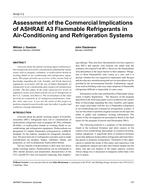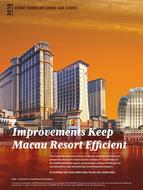Combustion turbines (CTs) are increasingly used for electric power generation in combined heat and power (CHP) applications, including those in the district energy arena. However, CTs exhibit an inherent loss in power output as ambient air temperature rises, at precisely those times when power is most in demand and most highly valued.
This paper presents the concepts and benefits of cooling the inlet air entering CTs during times of high ambient air temperature. Various technologies are reviewed that can be and have been employed to achieve CT inlet air cooling (CTIAC). Comparisons are drawn between the technologies, and the advantages and disadvantages of the various techniques are described.
Actual examples are presented of CTIAC in district energy applications, illustrating the various technologies. During hot weather, CTIAC can typically achieve a CT power output improvement of 20% to 30%, as well as an efficiency improvement of 5%. CTIAC unit capital costs are often roughly half those of equivalent simple cycle CTs. Further enhanced cost benefits are described that are achievable when CTIAC is coupled with district cooling systems. CTIAC is projected to be of increasing value in future deregulated electric power environments.
Units: Dual
Citation: Symposium Papers, Atlanta, GA, 2001
Product Details
- Published:
- 2001
- Number of Pages:
- 8
- File Size:
- 1 file , 130 KB
- Product Code(s):
- D-22529


